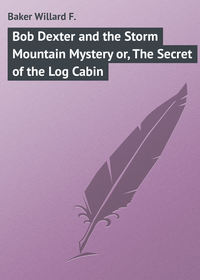Kitabı oku: «Bob Dexter and the Storm Mountain Mystery or, The Secret of the Log Cabin», sayfa 5
Bir şeyler ters gitti, lütfen daha sonra tekrar deneyin
Türler ve etiketler
Yaş sınırı:
12+Litres'teki yayın tarihi:
16 mayıs 2017Hacim:
190 s. 1 illüstrasyonTelif hakkı:
Public Domain